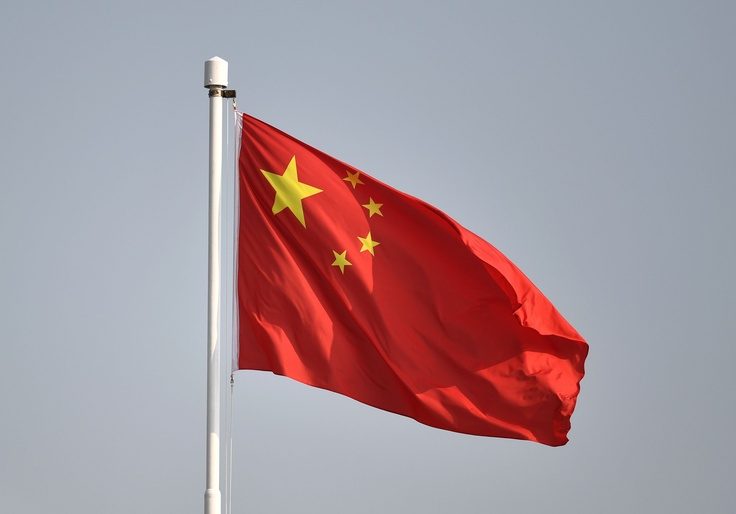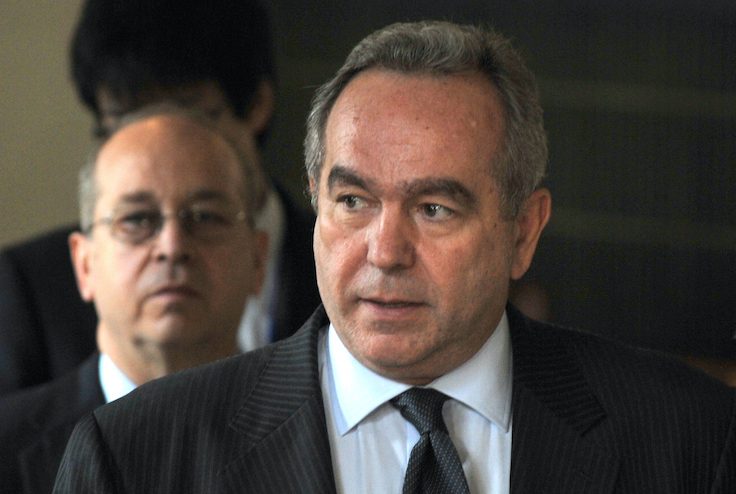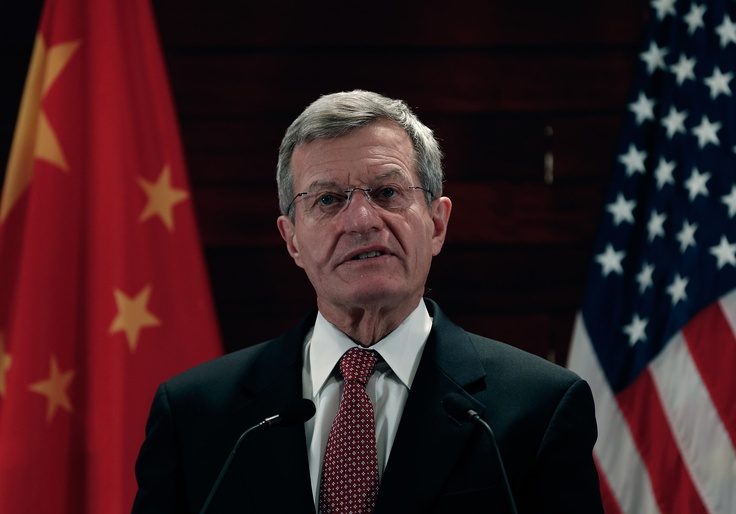DOJ Charges Chinese National With Stealing American Tech

The Department of Justice charged a Chinese national for his involvement in a years-long conspiracy to export American technology to China.
Cheng Bo, a 45-year-old employee at a Singapore-based electronics distributor, allegedly helped facilitate at least 18 illegal shipments of American power amplifiers to China between 2012 and 2015. Power amplifiers, which have military applications, face strict export controls.
FBI counterintelligence assistant director Alan Kohler Jr. said Cheng's efforts reflect a larger "relentless" effort to steal American technology to benefit Beijing.
"The People's Republic of China is relentless in its pursuit of U.S. technology, much of which can be used for military purposes," said Kohler in a statement Friday. "The FBI is just as relentless in identifying and stopping those who violate export controls while doing business with China. Let us be clear, this is not business as usual. It is illegal and individuals and companies will pay a price for such violations."
DOJ officials said Cheng's actions helped China secure at least $814,000 in American goods. If convicted, Cheng will serve up to 20 years in prison and face fines up to double the value of the fraudulent transactions.
Cheng's case is only the latest in a series of arrests and charges related to Chinese espionage and interference in American affairs. Earlier this month, a senior NASA scientist pleaded guilty to lying about his connections to a Chinese espionage program. In December, Rep. Eric Swalwell (D., Calif.) came under fire for his ties to Fang Fang, a suspected agent of the Chinese Communist Party who developed extensive ties to California's Democratic Party.
THE BIDEN KLEPTOCRACY
RIDING THE DRAGON: The Bidens' Chinese Secrets (Full Documentary)
https://www.youtube.com/watch?v=JRmlcEBAiIs
Schweizer: ‘It’s Going to Be Business as Usual’ for Hunter’s Dealings
Video:

20 Jan 2021185
0:52
On Wednesday’s broadcast of the Fox News Channel’s “Hannity,” Breitbart News senior contributor Peter Schweizer said he reads President Biden’s statements about his son Hunter’s deals as a declaration that “it’s going to be business as usual in the Biden administration as far as these deals are concerned.”
Schweizer said, “Joe Biden has said there are going to be no sketchy overseas deals during his second term. Here’s the problem: He does not believe that the early deals that Hunter was involved in, the China deal, Burisma, he’s never described those as sketchy. So, I read that as saying, it’s going to be business as usual in the Biden administration as far as these deals are concerned.”
Follow Ian Hanchett on Twitter @IanHanchett
THE BANKSTER OLIGARCHY THAT DESTROYED AMERICA
COVERS THE FRADULENT 'POPULIST' HOAX STAGED BY OBAMA, CLINTON AND BIDEN EVEN AS THEY SERVED WALL STREET BANKSTERS AND THE SUPER RICH... AND FILLED THEIR POCKETS DOING SO.
Chris Hedges: How Republicans, Democrats, and the Media Have Weakened US Democracy
https://www.youtube.com/watch?v=B2jyzp09_g8
Biden’s Asia Policy Czar Helped Found Group ‘Heavily Influenced by the CCP’
China hawk: Kurt Campbell's U.S.-China Strong Foundation 'tantamount to a front group'

Joe Biden's incoming Asia policy czar was a top leader at a nonprofit group that was bankrolled by the head of a Chinese propaganda front group and partnered with a Chinese foreign mission.
Kurt Campbell, a former Obama State Department official and businessman, was until August 2020 listed as board vice chairman of the U.S.-China Strong Foundation, ostensibly a nonprofit group that promotes student language exchanges with Beijing but whose leaders included prominent members of the Chinese government’s overseas propaganda fronts, according to State Department and Department of Justice records.
Campbell is slated to serve as the chief coordinator for President Joe Biden’s Asia policy on the National Security Council, but his leadership role with the foundation is raising concerns with China hawks in Washington. The foundation has promoted the Chinese army and China's Belt and Road Initiative—deemed a national security threat by U.S. officials. It has also partnered with the Confucius Institute U.S. Center, an educational nonprofit organization that the State Department designated as a foreign mission last summer, citing its promotion of Beijing's propaganda efforts to academics across the world.
In August 2017, the U.S.-China Strong Foundation appeared to celebrate the founding of the People’s Liberation Army on its Twitter account, writing, "Today is the 90th anniversary of the founding of China's PLA!" and urging followers to read about a commemorating address by President Xi. The group also posted multiple favorable Twitter messages about China’s Belt and Road Initiative, a global infrastructure program that U.S. officials have decried as a national security risk.
"The indicators suggest that the U.S.-China Strong Foundation could be a [Chinese Communist Party] front group, or so heavily influenced by the CCP as to be tantamount to a front group," said Anders Corr, an intelligence analyst and publisher of the Journal of Political Risk.
The U.S.-China Strong Foundation’s website appears to have vanished from the internet in August 2020, and its phone number and email address are no longer in service. An archived version of the website, however, listed Campbell as vice chairman and a member of the corporate advisory board as recently as Aug. 15, 2020. He is also listed as vice chairman in the group’s most recent federal financial disclosure, filed in 2019.
The foundation is bankrolled by Florence Fang, a Chinese-American philanthropist who sits on the group’s board and corporate leadership council. Fang is listed as the honorary president of the San Francisco chapter of the National Association for China’s Peaceful Unification, which promotes unified Chinese control over Taiwan. According to the State Department, the association is controlled by the United Front Work Department, the Chinese government’s primary overseas propaganda agency.
Fang, who also goes by the name Fang Li Bangqin, is regularly quoted in state-run media outlets and pictured meeting with Chinese government leaders, including President Xi Jinping. In 2017, Fang met with then-vice premier Liu Yandong, who said their friendship began when Liu served as head of the United Front Work Department in the early 2000s.
Hong Kong billionaire Ronnie Chan is also listed as a member of the U.S.-China Strong Foundation’s leadership council. Chan is a former Hong Kong government official and a governor of the China-United States Exchange Foundation, a registered foreign agent of the Chinese government, the Washington Free Beacon reported last July.
Other U.S.-China Strong Foundation board members include Pin Ni, the head of Chinese conglomerate Wanxiang's U.S. subsidiary, and Cindy Mi, the head of a Chinese-American educational company that reportedly fired teachers for teaching about the Tiananmen Square massacre.
The U.S.-China Strong Foundation was founded in 2013 and was previously known as the "100,000 Strong Foundation." The group was a privately funded spinoff of an Obama administration joint initiative with the Chinese government in 2010 to encourage 100,000 American students to travel to China to learn Mandarin through foreign-language exchanges.
The initiative was spearheaded by Campbell, who served as assistant secretary of state for East Asian and Pacific affairs at the time. Then-secretary of state Hillary Clinton credited Campbell for advancing the project in a Jan. 24, 2013, speech and praised him for helping to "deepen and strengthen our relationship with China and others in the region."
Campbell left his government post just a couple of weeks later and immediately helped launch the U.S.-China Strong Foundation as an independent nonprofit with more than $1 million in seed funding from Florence Fang and the Ford Foundation, according to a Politico column he wrote at the time.
Although the foundation initially seemed aimed at supporting American language exchange programs in China, its work has also focused on promoting Chinese cultural centers in the United States and even pro-Beijing policies.
The foundation has partnered with the Confucius Institute U.S. Center, an umbrella group of Chinese-language educational centers partially funded by the Chinese government. The U.S. State Department has said the institutes actively seek to influence students and academics as part of "Beijing’s multifaceted propaganda efforts" and designated the group as a foreign mission in August.
In 2018, the U.S.-China Strong Foundation cohosted a "panel discussion" with the Confucius Institute U.S. Center at the National Press Club titled, "U.S.-China Educational Exchanges: 40 Years of Engagement in Higher Education." The event came as federal agencies were starting to crack down on Confucius Institutes on American campuses and seemed timed to defend the program against public criticism.
"The kinds of groups that Campbell associates with typically promote ‘engagement,' ‘cooperation,' and ‘understanding' between the U.S. and China," said Corr. "The words sound great, but the CCP is using these words as cover for infiltration operations."
Campbell is not the first Biden-administration official whose China-related work has drawn scrutiny. Secretary of State Antony Blinken’s consulting firm, WestExec, helped American universities raise money from China while sidestepping Pentagon grant restrictions, the Free Beacon reported in December. And Biden’s nominee for a top Pentagon post, Colin Kahl, works at a research institute that runs an outpost at Peking University, the Free Beacon reported in January.
Obama’s Man in China Now Beijing’s Man in Washington
Former ambassador Baucus appears regularly on Chinese propaganda outlets

As the novel coronavirus wreaks havoc across the world, the Obama administration's ambassador to China has found a second lease on life as a pro-China talking head on regime propaganda outlets.
Former ambassador Max Baucus has given at least four different interviews to Chinese propaganda outlets in the last two weeks, repeatedly comparing the U.S. rhetoric about China to both the McCarthy era and Nazi Germany.
"Joe McCarthy [and] Adolf Hitler … rallied people up, making people believe things that were really not true," Baucus said during a May 12 interview with China Global Television Network (CGTN), a regime mouthpiece. "The White House and some in Congress are making statements against China that are so over the top and so hypercritical, they are based not on the fact, or if they are based on fact, sheer demagoguery, and that's what McCarthy did in the 1950s."
Since his retirement in 2017, Baucus has been a reliable critic of the Trump administration's increasingly confrontational China policy—chiefly the decision to wage a trade war with Beijing. He once warned that the White House's decision to impose additional tariffs was a "slap on the face" to China. But Baucus's recent comments in the pandemic era have been more sympathetic to China—and critical of the United States—than ever before.
His post-retirement public statements praising China have coincided with his burgeoning overseas investments. In 2017, he founded the Baucus Group, a consulting firm that advises both American and Chinese businesses, according to his U.S. Chamber of Commerce biography. He also sits on the board of directors for Ingram Micro, a U.S. subsidiary of a Chinese state-owned conglomerate, as well as the board of advisers for Alibaba Group, one of China's largest tech companies.
Walter Lohman, director of the Asian Studies Center at the Heritage Foundation, said that it was "inappropriate" for a former ambassador to speak ill about his own government on a foreign propaganda outlet.
"It's like going to China and … talking about your own government that way in meetings. I think that would be pretty inappropriate," Lohman said. "So it would be inappropriate speaking on state media."
Baucus's public statements have received considerable attention from Beijing's propaganda outlets. When the former ambassador compared President Donald Trump's criticism of China to rhetoric used by Adolf Hitler and Joe McCarthy during a May 6 interview with CNN, Chinese propaganda outlets quickly amplified Baucus's comments about how Trump was "a little bit like Hitler in the '30s" and that Americans were worried about "getting their heads chopped off" if they voice their disagreement with the U.S. government's China policy. Xinhua News Agency, a state-owned outlet, extensively cited Baucus's attacks in a May 8 article, using it as evidence that the Trump administration is attempting to "deflect criticisms about their blunders by blaming China." The article was syndicated in party-controlled mouthpieces such as Global Times and People's Daily, according to the Investigative Research Center.
Baucus then appeared on CGTN on May 12 to double down on his Hitler and McCarthy comparison, blaming the Trump administration for flaming "sheer demagoguery."
"[The current U.S. rhetoric] is somewhat reminiscent, nowhere close to that yet, somewhat reminiscent of the McCarthy era and somewhat reminiscent of Germany in the 1930s," he told CGTN.
The former ambassador also gave an exclusive interview to Global Times on May 14, where he said Secretary of State Mike Pompeo's claim that the virus may have originated in a Wuhan laboratory "makes no sense" and accused both Democrats and Republicans of being tough on China to score political points in an election year.
Baucus again appeared on CGTN on May 15, where he claimed that America is "sliding toward a form of McCarthyism" because the Trump administration is pressuring policymakers to be tough on China. The former ambassador did another CGTN media hit on May 16, this time appearing alongside his wife Melodee Hanes, who blamed the presidential election for making dialogue "difficult."
"There are a lot of pretty smart people in the United States who are not speaking up. People in office, moderates, especially moderates on the Republican side," Baucus said on May 15. "They are afraid to speak up, they are intimidated, intimidated by President Trump. And it's kind of sliding toward a form of McCarthyism—how it is politically incorrect to speak the truth, speak the truth to power."
When the Washington Free Beacon called the phone number listed for Baucus's home address, no one answered. A lawyer representing Baucus Group, the ambassador's consulting firm, also did not respond to a request for comment.
While Baucus rarely enjoyed this much attention from Chinese state media outlets after his retirement, this is not the first time he has spoken to Chinese media outlets in recent years. Baucus also gave an exclusive interview to People's Daily in March 2018, criticizing U.S. tariffs on Chinese goods as the "wrong policy" and "too confrontational." He has also spoken at events backed by the China-U.S. Exchange Foundation, a registered foreign agent of the Chinese government according to a 2018 congressional report.
Lohman, the Heritage Foundation expert, said that while Baucus has the right to appear on any domestic and foreign outlets, he should not have addressed a propaganda outlet with the same degree of candidness that he did with CNN.
"I think he must have gotten wrapped up in the media performances because when you shift from CNN to Global Times or CGTN, you've gone to an entirely new level," he said. "And there I think you just have to express yourself differently. It's not an appropriate place to air political differences."
No comments:
Post a Comment